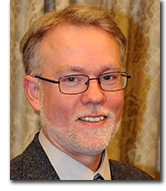
- associate professor of History (Hamilton campus)
- studied in Paris as a doctoral student to do research on French history
- has been conducting research on the Civil War for more than 10 years
- winner of the 2014 Gilder Lehrman Lincoln Prize for his book, Writing the Gettysburg Address
Background
"I received a PhD in French history in 1993 from Brown University. To obtain that degree, I stayed in Paris to do research on 19th century France, and since then I have worked at a number of jobs in Las Vegas, Rhode Island, and Massachusetts. I finally began teaching at Miami’s Hamilton campus in 2004.
"I chose French history as my focus of study because I had some really dynamic professors in that subject. I also enjoy the French language and thought it would be a great opportunity to spend time in France. I was given the opportunity to go there to conduct my research, so it all came together really well.
"I have written a couple of books, including Writing the Gettysburg Address, for which I later won the 2014 Gilder Lehrman Lincoln Prize. I also have worked as an editor at Miami University Press for a while before moving on to other things."
Teaching
"I mainly teach world history and have been doing most of it online for the past few years. However, this past spring I taught a course on what I call 'the Civil War Memory.' This class focused on how the Civil War is remembered and commemorated in the United States. Students in this course expect to talk about battles, generals, and things like that, so I do a little bit of that too, but it's mainly about commemoration.
"What I enjoy most about teaching is the different ideas that one experiences. By this I mean that a course can be taught five different times, and each time students will express different ideas than before. I'm always amazed by the variety of perspectives and different points of view!
"Miami professors, for the last ten years or so, have been focusing more and more on teaching skills. Miami is really advanced in a lot of places, and so after coming here I had to rethink a bit about my own way of teaching—moving away from the details of content and fact and towards the skills emphasized in the Miami Plan.
"In my teaching philosophy, I try to instill or provide a foundation for long-term growth. I strive to introduce people to the variety of things that are out there and then let them follow what they will. This is because after they leave the classroom, teachers no longer have any real ability to shape students on a day-to-day basis. If we can open up new worlds for our students, I think that's a very good thing to do."
Research
"For over ten years I've been researching the Civil War. I have written a couple of smaller articles and also my 2014 book on the Gettysburg Address, which focuses on the process Lincoln used to write it.
"Although I was trained in French history and teach world history, most of my current research is on the Civil War. Because of that, I no longer go back to France for research, but I was there a couple years ago just for pleasure."
Outside the Classroom
"Most of my pastimes could be considered the standard things that most people like to do, such as watching TV, going to museums, and other related activities.
"Beyond that, for the most part, I spend most of my time teaching, writing, and researching. These activities do not just fall into a 40-hour week, as most professors would tell you! Your work is always with you, and you're always doing something, even when reading just for pleasure. I like spending my time reading in various fields of history."
[January 2015]
 Miami University Oxford, Ohio est. 1809
College of Arts and Science
Miami University Oxford, Ohio est. 1809
College of Arts and Science
 Miami University Oxford, Ohio est. 1809
College of Arts and Science
Miami University Oxford, Ohio est. 1809
College of Arts and Science